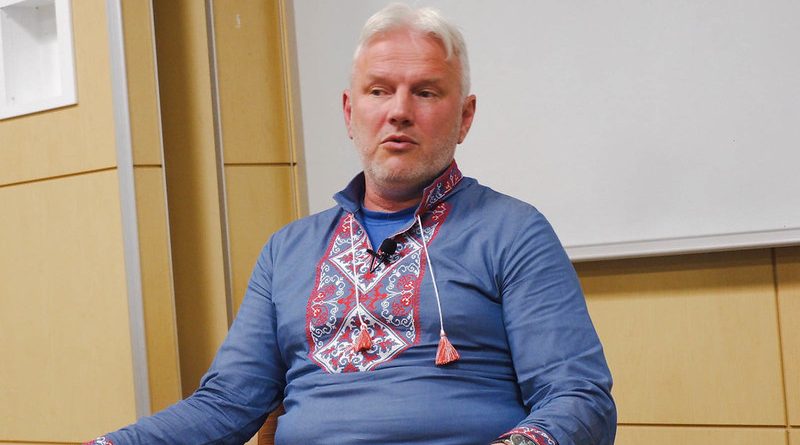Visiting Professor Volodymyr Dubovyk Discusses his Experience as a Ukrainian Academic Amidst the Russia-Ukraine War
By Alex Avaneszadeh, MALD 2023 Candidate, The Fletcher School
Russia’s invasion of Ukraine has put numerous Ukrainian scholars at risk. From damage to physical infrastructure to the loss of electricity and internet connectivity, Ukrainian academics find themselves working and teaching in new and harsh learning environments.
On January 31, 2023, Tufts University held a conversation with visiting professor Volodymyr Dubovyk about his experience as a scholar amidst the Russia-Ukraine war, as well as the short- and long-term challenges that scholars in Ukraine are facing. Dubovyk is an Associate Professor at Odesa Mechnikov National University in Ukraine, and the discussion was moderated by Arik Burakovsky, Assistant Director of the Fletcher Russia and Eurasia Program.
Dubovyk said, “We are all at risk right now–the risk of losing our job, family members. Having become a scholar at risk on February 24 last year, I myself continue to teach. Luckily, we found out that Russian troops were not able to get as close to my hometown of Odessa, and that we were going to be working online. But I cannot imagine myself not going back to Odessa in the long term.”
In general, learning, teaching, and research have all been affected by the war to varying degrees based on where the Ukrainian academic institutions are located.
“Mariupol State University is now nonexistent. It is all destroyed. They are now operating from Kyiv. Luckily, in Odessa, we did not have damage to buildings in my university,” Dubovyk added.
Aside from damage to infrastructure, the lack of state funds in the budget for education and the enactment of martial law have also impacted the learning environment in Ukraine.
Dubovyk explained, “Martial law prohibits how many men can leave the country during war. Females can move freely. Some of my colleagues and students moved out of Ukraine… a lot of students have left. Parents do not have money to pay for education, and we have a major drop in the number of students entering and staying in school. Since we now spend so much on defense and weapons, even with help from outside, everything in the social sphere is going to be underfunded. The international community’s participation in helping Ukraine go through this will be of critical significance.”
That said, Ukrainian universities and their international partnerships have played a key role in assisting professors, researchers, and students from Ukraine.
“Dozens of American universities are members of a network that has saved scholars at risk, offering them various academic positions. For those who can get out of the country, they can pursue positions in the U.S., Canada, or elsewhere. Quite frankly, the number of those positions has plummeted. You can also apply for non-resident fellowships, for which the number of those has actually increased,” Dubovyk noted.
“I am still getting a salary from my university doing online courses, but it is a small salary eaten by inflation. The lifelines for Ukrainian professors are non-resident fellowships, grants, etcetera. There is a challenge for people in the West on how to better help scholars at risk,” he said.
Despite teaching remotely for his university in Odessa, there are disadvantages with teaching both online and offline.
“There are problems with power outages in the country, resulting in no internet. So I do not know what will happen next semester in my university,” said Dubovyk. “Both online and offline options have many disadvantages. If you do it online, there is a chance that there will be no internet. If you do it offline, then a missile might be flying, and we may expect a strike. We are running out of options in terms of how to organize our process.”
As for Odessa, Dubovyk stated, “It is one of the worst situations in terms of power supply. People would go without electricity for days. No internet, no water supply, no heating–basically in the stone age.”
In general, Professor Dubovyk described his current situation as a “very unusual experience.”
“We have been learning about internally displaced persons in other countries for years, but I became one of them,” expressed Dubovyk. “Earlier in the war, I was speaking at roundtables and panels online and was struggling to maintain composure. I have learned to deal with this.”
Regarding his goals in the U.S., Professor Dubovyk explained that he wanted to contribute to the discussion about how and why the United States should support Ukraine.
“I think I knew…how I can be useful and contribute to the discussion about Ukraine, how [the U.S.] can better help Ukraine and why the U.S. should stick with Ukraine, the values that this country espouses, and…the interests that the U.S. has with Ukraine,” said Dubovyk.
In concluding the conversation, Professor Dubovyk underscored some of the goals and challenges facing Ukrainians.
“Ukrainians are determined to try and liberate their occupied lands. We are losing our best and brightest on the front lines, even with the best weapons provided to us by our allies. It is heavy lifting for the Ukrainian Army and society to continue fighting. Russia can stop the war, but Ukraine cannot. If we stop fighting, we will be taken over. It is a national survival situation,” he said.


